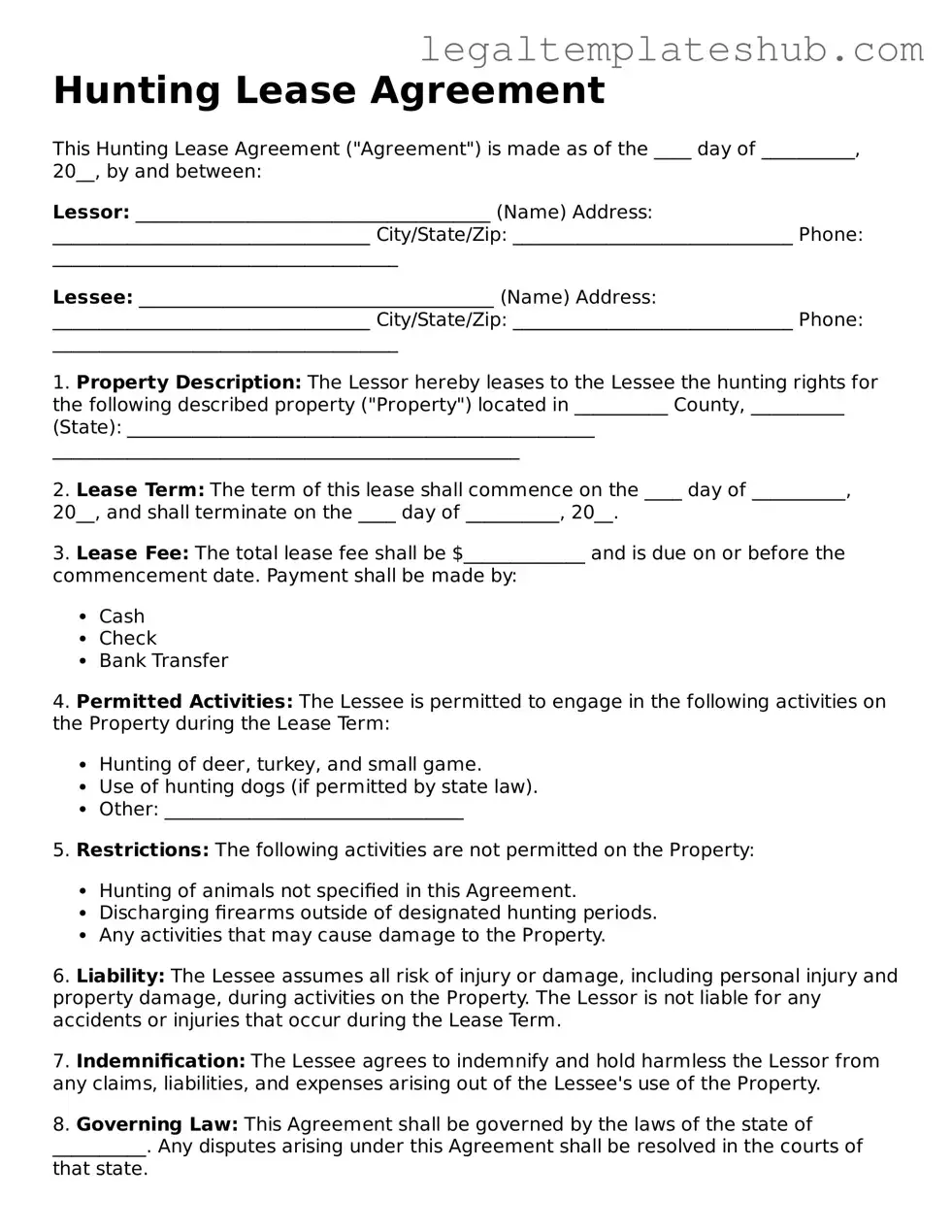Printable Hunting Lease Agreement Template
PDF Form Data
| Fact Name | Description |
|---|---|
| Purpose | A Hunting Lease Agreement is a legal document that outlines the terms under which a landowner allows hunters to access their property for hunting purposes. |
| Key Components | This agreement typically includes details such as the duration of the lease, payment terms, and rules regarding the use of the land. |
| State-Specific Forms | Many states have specific requirements for hunting lease agreements, governed by local laws related to land use and hunting regulations. |
| Liability Considerations | It is crucial to address liability issues within the agreement to protect both the landowner and the hunters in case of accidents or damages. |
Key takeaways
Filling out and using a Hunting Lease Agreement form is a crucial step in establishing a clear understanding between landowners and hunters. Here are some key takeaways to consider:
- Clarity of Terms: Ensure that all terms and conditions are clearly defined. This includes specifying the duration of the lease, the type of hunting allowed, and any restrictions that may apply.
- Liability Considerations: Address liability issues within the agreement. Both parties should understand their responsibilities and the extent of liability in case of accidents or damages.
- Payment Details: Clearly outline payment terms. This includes the total lease amount, payment schedule, and acceptable payment methods to avoid misunderstandings.
- Termination Conditions: Include conditions under which the lease can be terminated. This ensures that both parties are aware of their rights and obligations if the agreement needs to be ended prematurely.
Dos and Don'ts
When filling out a Hunting Lease Agreement form, it’s essential to approach the task with care and attention to detail. Here are some important do's and don'ts to consider:
- Do read the entire agreement carefully before filling it out. Understanding the terms and conditions is crucial.
- Do provide accurate and complete information. Ensure that all names, addresses, and dates are correct.
- Do ask questions if you are unclear about any part of the agreement. Communication can prevent misunderstandings.
- Do keep a copy of the completed agreement for your records. This will be helpful for future reference.
- Don't rush through the form. Taking your time can help avoid mistakes that may lead to issues later.
- Don't leave any sections blank unless instructed. Missing information can invalidate the agreement.
- Don't sign the agreement until you have reviewed it thoroughly. Signing prematurely can lead to unwanted obligations.
- Don't ignore local laws and regulations related to hunting leases. Compliance is essential for a successful agreement.
Common Types of Hunting Lease Agreement Forms:
Family Member Room Rental Agreement - Helps clarify pet policies among family members living together.
When entering a rental agreement in New York, it’s crucial to thoroughly understand the terms outlined in the lease; for this reason, using a reliable resource can be invaluable. Our guide to the New York Residential Lease Agreement can help clarify expectations between landlords and tenants, ensuring a smoother renting experience. For those who need a structured format, the PDF Templates provide a comprehensive option for completing your lease.
Instructions on Filling in Hunting Lease Agreement
Completing the Hunting Lease Agreement form is straightforward. Follow these steps carefully to ensure all necessary information is accurately provided. Once filled out, the agreement can be signed by both parties to finalize the lease.
- Gather Information: Collect the required details, such as the names and contact information of both the landowner and the hunter.
- Property Description: Clearly describe the property being leased. Include the address and any specific boundaries.
- Lease Dates: Specify the start and end dates of the lease period. Ensure these dates align with hunting seasons.
- Payment Terms: Indicate the rental amount and payment schedule. Be clear about when payments are due.
- Permitted Activities: List the types of hunting allowed on the property. Include any restrictions or limitations.
- Liability and Insurance: Outline any liability clauses and insurance requirements for the hunter.
- Signatures: Both the landowner and the hunter must sign and date the agreement. Ensure all signatures are legible.
Misconceptions
When it comes to Hunting Lease Agreements, there are several misconceptions that can lead to confusion. Here are four common misunderstandings:
-
Hunting Lease Agreements are only for large properties.
Many believe that only large tracts of land can be leased for hunting. In reality, even smaller parcels can be leased. It's about finding the right fit for both the landowner and the hunter.
-
All Hunting Lease Agreements are the same.
This is far from the truth. Each agreement can vary significantly based on the landowner's preferences, the type of game being hunted, and local laws. Customization is key.
-
You don’t need a written agreement if you have a verbal one.
While verbal agreements may seem sufficient, they can lead to misunderstandings. A written agreement provides clarity and legal protection for both parties.
-
Hunting Lease Agreements are only about the price.
While cost is an important factor, these agreements also cover rules, responsibilities, and liability. Understanding all terms is essential for a successful lease.
